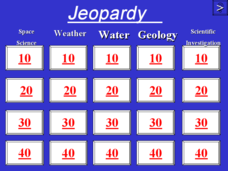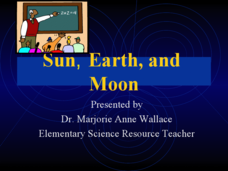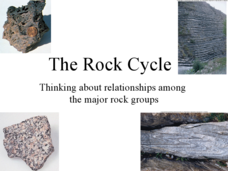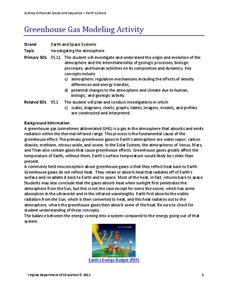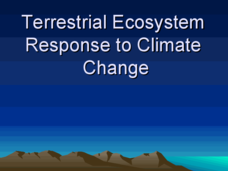Curated OER
Science Jeopardy - The Earth Sciences
The earth sciences are the focus for this Jeopardy-style review game. Categories include geology, space, scientific investigation, meteorology, and oceanography. Diagrams and pictures are involved with most of the questions, making this...
Curated OER
This Dynamic Earth: The Story of Plate Tectonics
Discuss Earth's tectonic plates at middle school level with an informative presentation. Packed with maps, satellite images, diagrams, and photographs, the slideshow connects with any curriculum focused on plate tectonics. It...
Curated OER
Jeopardy - Earth Sciences
Questions about water, weather, geology, astronomy, and the scientific process make up this Jeopardy game. It is a pretty well-rounded set of slides, although you may want to be aware that a few of the questions are specific to the state...
Curated OER
Earth Science
A slide for each of the planets (including recently downgraded Pluto), the sun, our moon, four of Jupiter's moons, and the rings of Saturn make up this visually appealing PowerPoint. A few facts for each body in the solar system...
Curated OER
The Search for El Nino
Sixth graders complete an El Nino scavenger hunt. In this earth science instructional activity, 6th graders describe the conditions that create El Nino and compare it to normal condition. They discuss how this phenomenon affects marine...
Curated OER
Sun, Earth, and Moon
Cute graphics make this an attractive presentation for upper elementary classrooms, and multiple choice questions make it interactive as well. There is, however, a lack of coherence. For example, slide #4 addresses the air we breathe,...
NOAA
Plate Tectonics II
Mid-ocean ridges, rift valleys, island arcs, mountain ranges, earthquakes, volcanoes ... there are so many features associated with plate tectonics. The 14th installment of a 23-part NOAA Enrichment in Marine sciences and Oceanography...
Curated OER
Plate Tectonics Day 4 Earth's Interior Structure and Convection Currents
Middle schoolers introduced to the interior structure of the Earth. They explore how the Earth's interior is broken down according to both it's physical properties and it's chemical composition. Students explore how convection currents...
Curated OER
The Rock Cycle - Thinking About Relationships Among the Major Rock Groups
Step-by-step, arrow-by-arrow, viewers are walked through the rock cycle. In the end, you have a simple, yet complete diagram of the process. Pictures appear to show samples of igneous, sedimentary, and metamorphic rocks. The presentation...
NOAA
Plate Tectonics I
Young geologists get a glimpse beneath the earth's surface in this plate tectonics investigation. After first learning about the different layers of the earth and the constant movement of its plates, young...
Curated OER
An Introduction to GPS
GPS is a technological tool that has become available for use by the general public. Navigate the components and science involved in this remote sensing system. Here is a comprehensive collection of slides that would be valuable to share...
Curated OER
Ocean Waves and Tides
Except for a few blurry photos that you can leave out, this is a succinct, yet purposeful presentation. It explains what causes ocean waves, the parts of a wave, and how they break against a shore. It details the cause of tides and...
Virginia Department of Education
Greenhouse Gas Modeling Activity
Why are greenhouse gases called greenhouse gases? Young Earth scientists learn about greenhouse gases though experimentation in the second installment of a 3-part series. They use lamps to model radiant energy as well...
Curated OER
Topographic Maps
Sometimes it is difficult to grasp topographic maps. Here is a clever presentation designed to help your middle school earth scientists understand. Beginning with a side view of a pair of mountains, a graphic guy walks up one slope. As...
Curated OER
Astronomy - Ancient Philosophies
Combine science and social studies with this collection of notes on ancient astronomy. Ideas propagated by early scientists influenced the way people viewed life and our place in the universe. Examine the philosophies of Aristotle,...
Curated OER
Terrestrial Ecosystem Response to Climate Change
An extensive investigation of the Earth's climate changes awaits your environmental science classes. This top-notch presentation begins by looking at the history of Earth's climate and then predicts the impact on each major terrestrial...
Curated OER
Storm Clouds-- Fly over a Late Winter Storm onboard a NASA Earth Observing Satellite
Students study cloud data and weather maps to explore cloud activity. In this cloud data lesson students locate latitude and longitude coordinates and determine cloud cover percentages.
Curated OER
Fostering Geospatial Thinking: Space to Earth: Earth to Space (SEES)
Students locate and access data to help them with their science inquiry. In this geographical positioning lesson students evaluate and compare data sets.
Virginia Department of Education
The Hydrologic Cycle
There is the same amount of water on earth now as there was when it was formed. The water from your faucet could contain molecules that dinosaurs drank! Young scientists build their own hydrologic cycle model and observe...
Curated OER
Rivers & Watersheds
An outstanding presentation of rivers and watersheds awaits your earth scientists! The erosion process created by rivers is addressed. Viewers are introduced to v-shaped valleys, alluvial fans, and watersheds. Several slides are...
Curated OER
A Comparison of Cloud Coverage Over Africa
Students use a NASA satellite data to contrast amounts of cloud coverage over different climate regions in Africa. They explore how Earth's major air circulations affect global weather patterns, and relate to local weather patterns.
Curated OER
El sistema solar
Everyone loves learning about space; there's something incredible about how all of this came to be, isn't there? Engage your Spanish language learners with this interesting topic. First, have each pupil cut out their vocabulary...
NOAA
Currents
Learn how ocean currents are vital to humans and marine life. The eighth installment of a 23-part NOAA Enrichment in Marine sciences and Oceanography (NEMO) program, focuses on ocean currents and how they affect global climate. The...
Virginia Department of Education
Mineral Identification
What's the difference between a rock and a mineral? And what properties are used to identify minerals? The first installment of a five-part series on earth materials and processes prompts young scientists to identify a set of...




